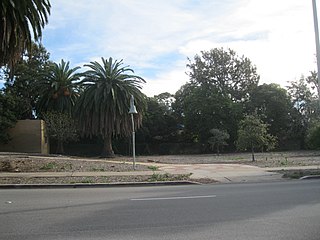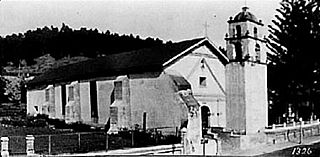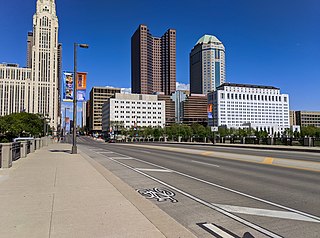
Ventura, officially named San Buenaventura, is a city in and the county seat of Ventura County, California, United States. The population was 110,763 at the 2020 census. Ventura is a popular tourist destination, owing to its historic landmarks, beaches, and resorts.

The Richard Nixon Birthplace is the birthplace and early childhood home of Richard Nixon, the 37th president of the United States. It is located on the grounds of the Richard Nixon Presidential Library and Museum in Yorba Linda, California, and serves as a historic house museum.
The western border of Santa Monica, California, is the 3-mile (4.8 km) stretch of Santa Monica Bay. On its other sides, the city is bordered by various districts of Los Angeles: the northwestern border is Pacific Palisades, the eastern border is Brentwood north of Wilshire Boulevard and West Los Angeles south of Wilshire, the northeastern border is generally San Vicente Boulevard up to the Riviera Country Club, the southwestern border is Venice Beach and the southern border is with West Los Angeles and Mar Vista.

Downtown San Diego is the city center of San Diego, California, the eighth largest city in the United States. In 2010, the Centre City area had a population of more than 28,000. Downtown San Diego serves as the cultural and financial center and central business district of San Diego, with more than 4,000 businesses and nine districts. The downtown area is the home of the San Diego Symphony and the San Diego Opera as well as multiple theaters and several museums. The San Diego Convention Center and Petco Park, home of the San Diego Padres, are also located downtown. Downtown San Diego houses the major local headquarters of the city, county, state, and federal governments.


Downtown Santa Ana (DTSA), also called Downtown Orange County, is the city center of Santa Ana, the county seat of Orange County, California. It is the institutional center for the city of Santa Ana as well as Orange County, a retail and business hub, and has in recent years developed rapidly as a regional cultural, entertainment and culinary center for Orange County.

Broadway–Flushing is a historic district and residential subsection of Flushing, Queens, New York City. The neighborhood comprises approximately 2,300 homes. It is located between 155th and 170th Streets to the west and east respectively, and is bounded on the north by Bayside and 29th Avenues, and on the south by Northern Boulevard and Crocheron Avenue. Broadway–Flushing is listed on the National Register of Historic Places.

El Pueblo de Los Ángeles Historical Monument, also known as Los Angeles Plaza Historic District and formerly known as El Pueblo de Los Ángeles State Historic Park, is a historic district taking in the oldest section of Los Angeles, known for many years as El Pueblo de Nuestra Señora la Reina de los Ángeles del Río de Porciúncula. The district, centered on the old plaza, was the city's center under Spanish (1781–1821), Mexican (1821–1847), and United States rule through most of the 19th century. The 44-acre park area was designated a state historic monument in 1953 and listed on the National Register of Historic Places in 1972.

Feraud General Merchandise Store, also known as 1903 Building, was built in 1903 in Ventura, California. Jules Feraud opened the Feraud Bakery and Grocery Store and the bakery stayed in the family until 1944. The brick building is a rare intact example of turn-of-the-century commercial architecture during Second Land Boom after the tracks of the Southern Pacific Railroad arrived in Ventura. The City Council of Ventura designated the building Historic Landmark Number 35 by resolution on July 17, 1978. The building was listed on the National Register of Historic Places in 1986.

The Clinton Avenue Historic District in Albany, New York, United States, is a 70-acre (28 ha) area along that street between North Pearl and Quail streets. It also includes some blocks along neighboring streets such as Lark and Lexington.

The Downtown Albany Historic District is a 19-block, 66.6-acre (27.0 ha) area of Albany, New York, United States, centered on the junction of State and North and South Pearl streets. It is the oldest settled area of the city, originally planned and settled in the 17th century, and the nucleus of its later development and expansion. In 1980 it was designated a historic district by the city and then listed on the National Register of Historic Places.

The San Miguel Chapel Site is an archeological site in Ventura, California, United States, at the location of the first outpost and center of operations that was established while the first Mission San Buenaventura was being constructed. The San Miguel Chapel was located just outside the southwest corner of the walled garden that was constructed as part of the ultimate layout of the mission complex. The open space park is located at the southwest corner of Thompson Boulevard and Palm Street in downtown Ventura. Interpretative signs and public art have been added to the site, which is protected and managed as a natural environment by the city parks department.
Landmarks officially designated by local city or county governments in the United States.

The City of Ventura Historic Landmarks and Districts consist of buildings, sites, and neighborhoods designated by the City of Ventura, California, as historic landmarks and districts.
The Ventura County Historic Landmarks & Points of Interest consist of buildings, sites, and neighborhoods designated by Ventura County Cultural Heritage Board as historic landmarks and points of interest in Ventura County, California. The county board of supervisors created the Cultural Heritage Board in 1966 and in August 1968, two sites were designated: the Faulkner House near Santa Paula; and the Edwards Adobe in Saticoy. The scope was established to include the entire county: both cities and the unincorporated areas. The cities of Fillmore, Oxnard, Port Hueneme, Simi Valley, and Thousand Oaks have the county Cultural Heritage Board advise them and those designations are listed here. The cities of Moorpark, Ojai, Santa Paula, and Ventura established their own separate historic designation systems with the City of Ventura Historic Landmarks and Districts developing into an extensive list. The Port Hueneme Historical Society Museum houses historical artifacts, photographs and information on the history of the Hueneme area. The museum is in the Hueneme Bank Building.

The St. Vincent's Place is the second location of Saint Vincent College in Central Los Angeles, California. St. Vincent's Place was designated a California Historic Landmark (No.567) on Feb. 25, 1957. St. Vincent's College was started by Vincentian Fathers in 1865 and was the first College in Southern California. St. Vincent's Place is located at St. Vincent Court at 7th Street and Broadway in the City of Los Angeles in Los Angeles County. St. Vincent's College became L.A. College in 1911 and Loyola Marymount University in 1917. Saint Vincent's College used the Downtown Los Angeles site from 1868 to 1887. Broadway was called Fort Street in 1868. St. Vincent's Court is now a small alley running through the center of the former Bullock's complex, this was the main entrance to St. Vincent’s College in 1868, a keen city promoter remodeled it as a imitation of a European village square.

The Gates of Anaheim are a series of gates in California that mark the historic entrance to Anaheim, California. Four city gates were built: North, East, South, and West. They were designated a California Historic Landmark (No.122) on March 29, 1933.

Broad Street is a major thoroughfare in Central Ohio, predominantly in Franklin County and Columbus. It stretches east from West Jefferson at Little Darby Creek to Pataskala. The street is considered one of Columbus's two main roads, along with High Street.

The Moreton Bay Fig tree in the Palms neighborhood of Los Angeles is a large Ficus macrophylla tree that was planted in 1875 and landmarked in 1963. The St. John’s Presbyterian Church complex around the tree was established in 1962.


















